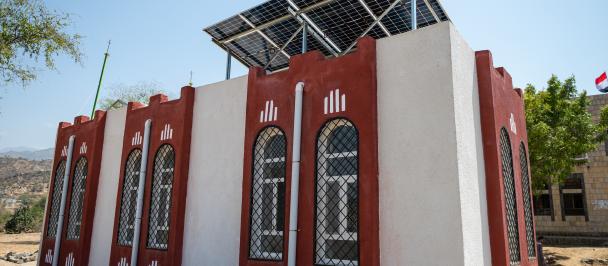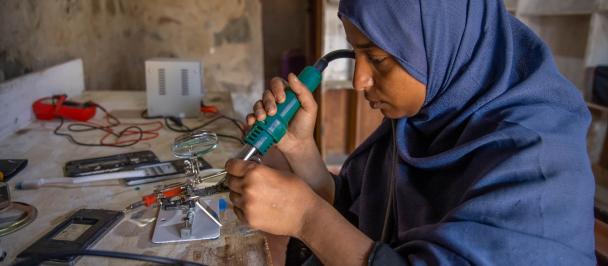The newly rebuilt maternity and child healthcare and storage facility in Lahj governorate after reconstruction.
Al Hawta District, Lahj Governorate: In response to community needs, the rehabilitation of the maternity and childhood healthcare and storage facility began in October 2018 and was recently completed. Managed by UNDP’s Social Protection Project for Community Resilience Project (SPCRP) and implemented by UNDP’s local partner – the Social Fund for Development (SFD) – the project was funded with USD $136,548 by the European Union (EU).
In 2015, the facility was severely damaged during armed clashes – decreasing its capacity to about 30 per cent and severely limiting access to health care services primarily for women and children.
Providing services to all 16 healthcare facilities including units, centers and hospitals in the Lahj governorate, the facility is both the largest and the primary medical storage facility in the governorate with four units (two buildings and two large storage facilities).
The rebuilding of the facility was a priority to the local authorities, as well as the Lahj Health Ministry Office. The rebuilding of the facility will enable the governorate Health Office to receive its allocated medicines and medical supplies, store them properly and redistribute them efficiently to the other health facilities. Supplies disseminated from this facility benefit an average 24,000 people per month.
Dr. Saleh Al-Hakam, Health Officer at the Social Fund for Development, noted that the intervention included reconstruction of the main storage and offices building and the rehabilitation of the secondary storage facilities, as well as, the medical equipment maintenance workshop. In addition, he highlighted that this intervention is only one-of-six other projects – four completed and two in progress – in the health sector for Lahj governorates under the Social Protection for Community Resilience Project (SPCRP).
The storage facility’s Medical Supplies Manager, Mr. Khaled Al-Subaihi, praised the high priority intervention saying, “We’re so grateful that we are now able to receive, store and redistribute all medicines, medical equipment, vaccinations, and other INGO’s malnutrition and food supplies again after we had lost over 70 per cent of the storage capacity.”
Dr. Aref Nasser, Lahj Health Ministry Office General Manager also expressed his gratitude, “We’re thrilled to re-inaugurate the storage facilities after they were almost totally destroyed in 2015 interrupting critical medical supplies and malnutrition and food assistance to all Lahj’s 15 districts. Unfortunately, we had to resort to storing some supplies improperly and under worrying conditions, but now our storage and distributions issues are resolved. We can accommodate all supplied from the ministry and humanitarian international organizations, such as the World Health Organization (WHO), the United Nations International Children’s Emergency Fund (UNICEF) and the World Food Programme (WFP) and store them properly”. He added, “I would like to thank the European Union for playing a true and active role in restoring basic health services in the governorate.”
Before it was not fully operational – but due to the urgency and importance – the storage facility was already being used by the Ministry of Health and International Organizations such as UNICEF and WHO to store vital life-saving medicines and vaccines before distributing to local health facilities. Additionally, it was also being used by WFP to store food aid for children and Internally Displaced Persons.
“As one of the health centers in the governorate, we relied heavily on this storage facility to receive our supplies of medicines for chronic diseases, maternity and reproductive health, malnutrition and children, as well as vaccines, emergency obstetric supplies, and supplies provided by relief organizations,” said Manager of the Maternity and Childhood Center in Al-Hawtah district, Ms. Hanan Hussein, pointing to the importance of the facility.
About the project
The Social Protection for Community Resilience Project (SPCRP) is funded and supported by the European Union (EU) and implemented in partnership with the UN Development Programme (UNDP) and The Social Fund for Development (SFD). The USD$28 million SPCRP aims to enhance the purchasing capacity of vulnerable communities while restoring community infrastructure and improving access to and delivery of key services through short-term employment, provision of solar energy equipment, rehabilitating healthcare facilities, and building the capacities of communities and local authorities.

 Locations
Locations





